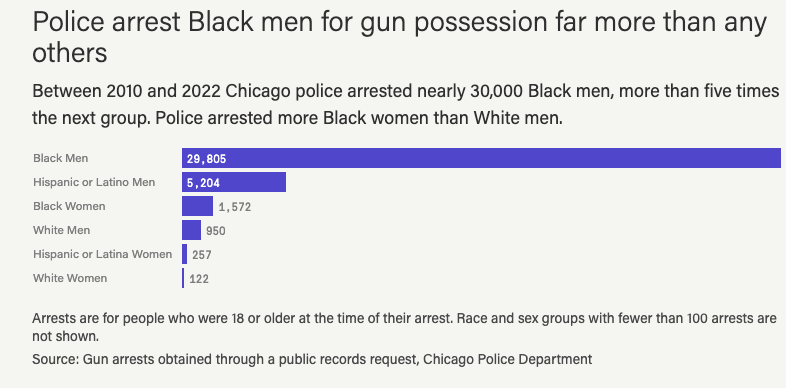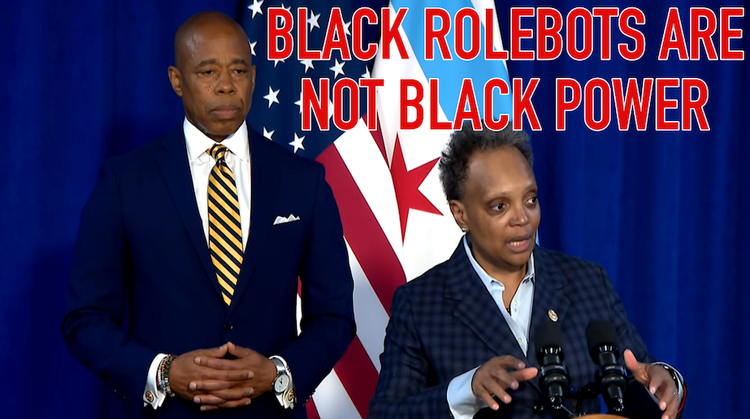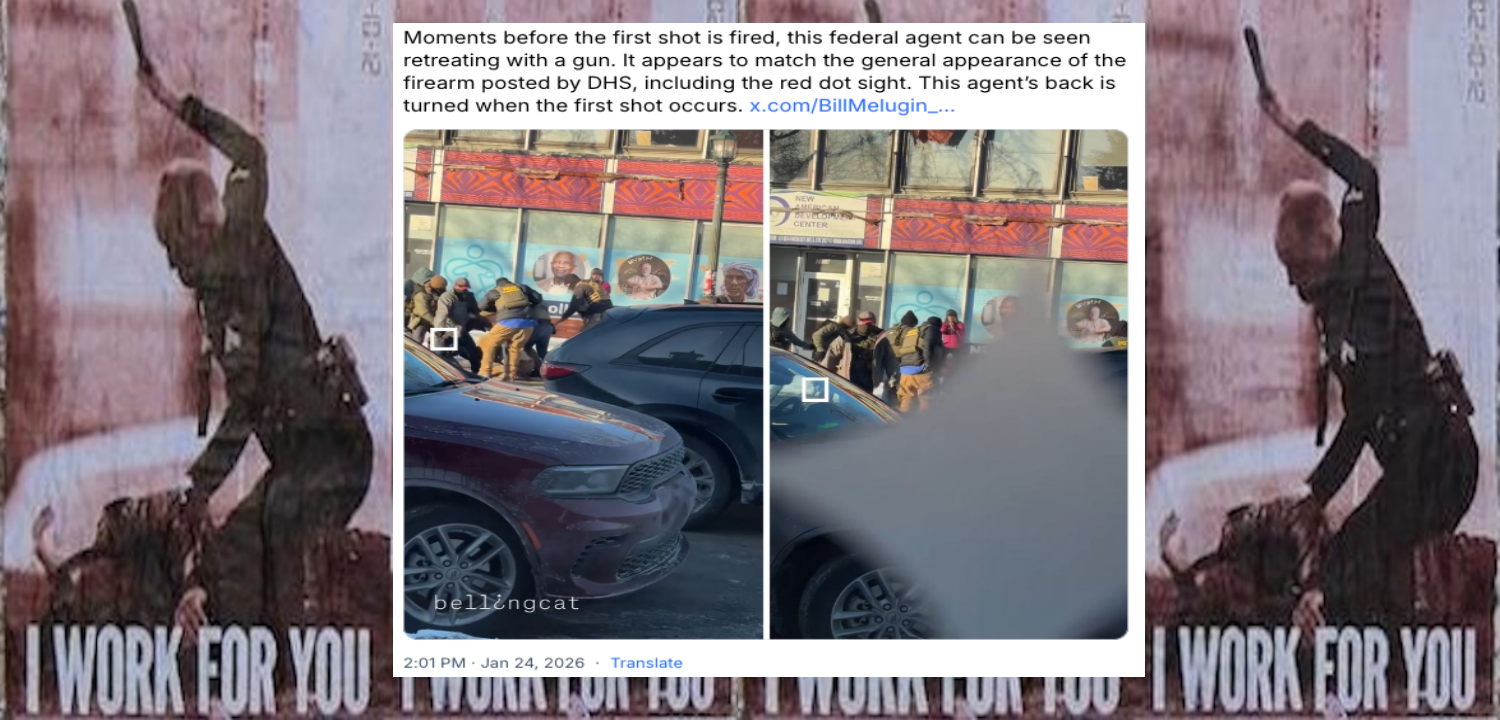‘You Want Me to Live in a Crime Ridden Area but I Can’t Protect Myself?’ Study Says Liberal Authorities Fail to to Make Arrests in Most Shootings but are Cramming Blacks Into Jails Over Gun Possession
/RACIST LIBERALS ARE ACCESSORIES TO CRIME. Note that all the cities discussed in this analysis from the Marshall Project are places dominated by elite white liberals; they control each jurisdiction’s major resources, utilities, industry, banks, media and own all major business, real estate and property, notwithstanding how many black rolebots hold political office or are placed into token leadership positions.
From [MARSHAL PROJECT] In Chicago, the race to get guns off the street often begins with a police stop.
Officers just need a pretext to search someone: A man in a white Ford Sedan blocking an alleyway. A bulge in a fanny pack at the beach. A man breathing heavily in a black Chevrolet Malibu as police approached. The smell of “fresh cannabis” wafting from an open window. Tinted windows. A missing license plate. Police reports show that the list goes on.
This article was published in partnership with WBEZ.
Authorities tout these arrests as an effective crime-fighting strategy. “Each gun recovered, regardless of how, is a potential life saved,” said former Chicago Police Superintendent David Brown in a press conference last year. It’s a common refrain repeated by officials from San Jose, California, to the small city of Utica, New York, as gun deaths rose across the country.
But in Chicago, a town labeled as “ChiRaq,” a “war zone,” and a “murder capital,” gun enforcement overwhelmingly focuses on possession crimes — not use.
A Marshall Project analysis found that from 2010 to 2022, the police made more than 38,000 arrests for illegal gun possession. These arrests — almost always a felony — doubled during this timeframe. While illegal possession is the most serious offense in most of the cases we analyzed, the charges often bear misleading names that imply violence, like “aggravated unlawful use of a weapon.”
Recent research shows that most people convicted in Illinois for felony gun possession don’t go on to commit a violent crime, and the majority of those sentenced to prison for gun possession don’t have past convictions for violence. Instead, people who already committed violent crimes are more likely to do so again.
The racial disparities in this enforcement are glaring. Although Black people comprise less than a third of the city’s population, they were more than 8 in 10 of those arrested for unlawful possession in the timeframe we reviewed. The number of Black people arrested could fill every seat at a Chicago Bulls game and then some; the majority are men in their 20s and 30s.
The consequences of these arrests are long-lasting. If convicted, people face a year or more in prison, depending on the charges. Even without time behind bars, those we interviewed faced damning criminal records, time on probation, job loss, legal fees and car impoundments.
Officials justify the focus on confiscating guns — even if they are not being fired at anybody — as a way of curtailing violence. But these tactics have not substantially reduced shootings in Chicago. In fact, as possession arrests skyrocketed, shootings increased, but the percentage of shooting victims where someone was arrested in their case declined.
“Guns are not assembly-line cases, and they shouldn't be treated as such,” says Chris Hudspeth, 31, who has been incarcerated for illegal gun possession. “I’m scared for my life — and I gotta go to prison because I fear for my life, for my family’s safety? Because we’re not fortunate enough to live someplace else?”
The Chicago Police Department did not respond to repeated requests for an interview, nor did they comment on findings The Marshall Project shared with them. Gun arrest practices rest with the next mayor, whom voters will choose in an upcoming runoff election. The options are stark: Brandon Johnson, a Black county commissioner pitching police reform, and Paul Vallas, a White perennial candidate and veteran education official backed by the city’s police union. Despite running on seemingly different platforms, both mayoral candidates are suggesting tough-on-gun policies to address public safety.
For this article, we read nearly 300 arrest reports to understand the tactics police use to find guns, and compiled decades of police data showing a history of discriminatory gun enforcement. We conducted more than 100 interviews with people navigating gun cases, researchers, attorneys and community members. Our reporting focused on Chicago, given its struggles with gun violence despite strict firearm laws, but we identified several other cities with similar trends.
The Marshall Project found that widespread stops and gun possession arrests — and the inability of Chicago officials to show they are working — have parallels to other discredited strategies like “broken windows” policing, stop-and-frisk and the war on drugs.
“People are for ‘gun control’ but against ‘mass incarceration,’” said James Forman Jr., a professor at Yale Law School and author of “Locking Up Our Own: Crime and Punishment in Black America.” “They haven’t thought about how this particular form of gun control ends up helping to produce and sustain mass incarceration.”
In a country where guns are deeply intertwined with race, class and safety, discussions about them are often guided by politics and sensationalism. But as officials try to address street-level gun violence and prevent yet anothermass shooting, it’s important to understand how firearm laws play out in reality, upending deeply ingrained assumptions about guns, who should have them, and how laws are enforced.
On an unseasonably warm day last October, 29-year-old Elijah Hudson decided to drive to work rather than take the train. On his way to pick up his son from daycare that evening, he turned onto a wide stretch of road downtown before Chicago police pulled over his silver Hyundai Genesis for expired license plates, arrest reports show.
After he agreed to settle the ticket in court, body camera footage we reviewed of the arrest shows an officer asking Hudson, “What’s with the attitude?,” and then asking if he was a licensed gun owner.
“I just don’t know what that has to do with expired license plates,” Hudson responded, not answering the officer’s question.
To legally purchase a gun and carry it in public, Illinois residents need two licenses: a firearm owner’s permit that costs $11 online and a concealed carry card. These licenses are referred to locally as a FOID and a CCL. Since Chicago has no gun ranges within the city, residents have to travel to the suburbs to participate in half of the legally required 16 hours of training. All together, the process can cost upward of $300 in fees and take several months.
If a person lacks both licenses — or has a gun owner’s card but not a concealed carry permit — they can be arrested for illegal gun possession.
Officers quickly became frustrated with Hudson, the footage shows, as he continued to question the relevancy of guns for the traffic stop.
“It has to do with all of our safeties. If there’s a firearm in this vehicle — all of our safeties are at risk now,” said an officer near the passenger side.
Hudson explained that his Smith & Wesson pistol was in a computer bag on the passenger-side floorboard. While he and an arresting officer standing near the driver’s side window debated over the stop, at least five additional police vehicles and nearly a dozen officers arrived on the scene.
“If he doesn’t have a FOID or CCL, I’m breaking the window — just letting you know,” another officer remarked while checking Hudson’s credentials. When a bystander told the police he was recording the interaction, police footage shows the initial officer retrieving Hudson’s unloaded gun from a police vehicle and then showing it off for the pedestrian to see.
Once police confirmed that Hudson was, in fact, a fully licensed gun owner, they arrested him for refusing an officer’s order, refusing to disclose his gun, and for having expired license plates.
A judge dismissed his charges weeks later. “It was almost like an ‘aha!’ moment,” Hudson said in an interview. “What if they are predatorily stopping CCL owners, minority owners, and they’re trying to find ways to charge them with something so they can legally confiscate your firearm?”
In December, Hudson filed a complaint with the city’s police oversight agency and held a small press conference. “I want the officers to be disciplined, and I want people to see how they have a presumption of criminality if you’re dark-skinned in Chicago, and you have legal firearms,” he said.
Illegal possession charges make up the majority of gun arrests.
According to our analysis of these arrests from 2010 to 2022, White men were underrepresented, as were White women. Chicago’s population is roughly a third White, and nationwide surveys suggest gun ownership is far more common among men than women. But over the years of data we reviewed, Chicago police arrested fewer than 1,000 White men — and more than 1,500 Black women.
Hispanic men and women were also underrepresented. Although they also make up about one-third of the overall population, they account for a little over 1 out of every 10 arrested.
We found that Black people make up the majority of those arrested across Chicago, regardless of neighborhood demographics. Two areas that buck this trend include the city’s international airports, O’Hare and Midway, where Transportation Security Administration agents call police when someone brings a firearm through security. In these neighborhoods, White people were more likely to be arrested.
But even after decades of arrests and guns seized, research and crime data show that Black communities in Chicago still bear the brunt of gun violence. The majority of those killed are Black men in their 20s and 30s. When combined with persistent economic and chronic health inequities, Black residents’ lives are almost 10 years shorter on average than their non-Black counterparts. Defenders of the current tactics argue that because gun violence harms Black communities, the arrests for gun violence reflect not racial disparities in enforcement, but the reality of where violence takes place.
But Daniel Webster, a researcher who studies gun violence reduction at Johns Hopkins University, says possession cases shouldn’t overshadow larger problems like gun trafficking or illegal sales. He said it’s important to acknowledge the disparity in gun violence without justifying racial profiling.
Chicago police can make thousands of arrests each year because courts have given them broad discretion on when they can stop and search someone for firearms.
To see what this looks like in practice, The Marshall Project requested public documents outlining the Chicago police strategy for seizing guns. The department told us there were no memos, presentations or reports available.
So we focused on more than 225 gun arrests conducted over last year’s Memorial and Labor Day weekends. We picked these holidays because they tend to have a heightened police presence.
We found that the overwhelming majority of those arrested were Black men. Most people had no arrest warrants out, nor were they on supervised release, probation or suspected of being in a gang. In most of the incidents we analyzed, police were not responding to 911 calls about a person with a gun.
In arrests where possession was the most severe charge — about 140 of the cases — we found that more than 7 in 10 began with a simple traffic violation. After this initial stop, police often used some other justification for a search.
Officers often did this by citing the smell of marijuana. Although Illinois legalized cannabis in 2020, smoking while driving is still prohibited.
In a third of the stops, we found the person arrested had their gun owner’s permit, but not the license that allowed carrying the loaded gun in public.
Above easily replaceable, unpluggable BLACK ROLEBOT PROXYMORONS WHO DELIVER NOTHING OF TANGIBLE VALUE TO THE gullible BLACK VOTARY WHILE WORKING ON BEHALF OF ELITE RACISTS.
who is it cramming the jails and courtrooms with Blacks in NYC, LOS ANGELES, Milwaukee, Chicago, Columbus, Minnesota, Washington D.C., Philadelphia, Oakland, Atlanta, Kansas City, St. Louis, Detroit, New Orleans and others? Who is striking Blacks from juries? Who is evicting Black tenants from their homes for failure to pay rent during the government’s COVID lockdowns? Who is providing a servant (mis)education to black children? Who is running the public fool systems? Who is gentrifying neighborhoods, dislocating Black families, businesses and making blacks homeless? Who is failing to protect law abiding black people in their segregated communities and preventing them from arming themselves in self-defense from criminals? Who is surveilling, stopping, frisking, and searching law abiding Blacks at will on a daily basis? Whose police officers frequently brutalize and murder blacks with impunity? WHO IS TELLING BLACKS THAT RACISM/WHITE SUPREMACY IS ABOUT BIGOTRY, MEAN WORDS AND NOT ANY OF THE ABOVE?? The answer is racist liberals. Specifically, white liberal; judges, prosecutors, jurors, landlords, government authorities, administrators, police officers, school teachers, school administrators, real estate agents, bankers, doctors, business owners, creditors etc., in places where the majority of Black people reside in the US - liberal jurisdictions. [MORE]
“People in the Black community have now started to teach themselves to just comply, just do what the officers want so you can stay alive,” said Takenya Nixon, an assistant public defender. “It completely negates the fact that you have constitutional rights, and that you do not have to allow an officer to search a car, and you are well within your rights to question an officer.”
These arrests have cascading consequences. For those arrested during a traffic stop, we found that more than a third had their cars impounded and faced a $2,000 city fee, in addition to the daily storage fees private companies impose.
The arrest reports show that many people were cooperative with police when they asked about guns, even if they hesitated to answer. In some cases, they told police they had the gun for safety.
“He has the firearm for protection due to him being shot and robbed in the past,” police noted after one arrest. “Arrestee related that he was shot at two Mondays ago in an attempt[ed] carjacking where he was the victim,” another report reads.

















































































































































































































































































